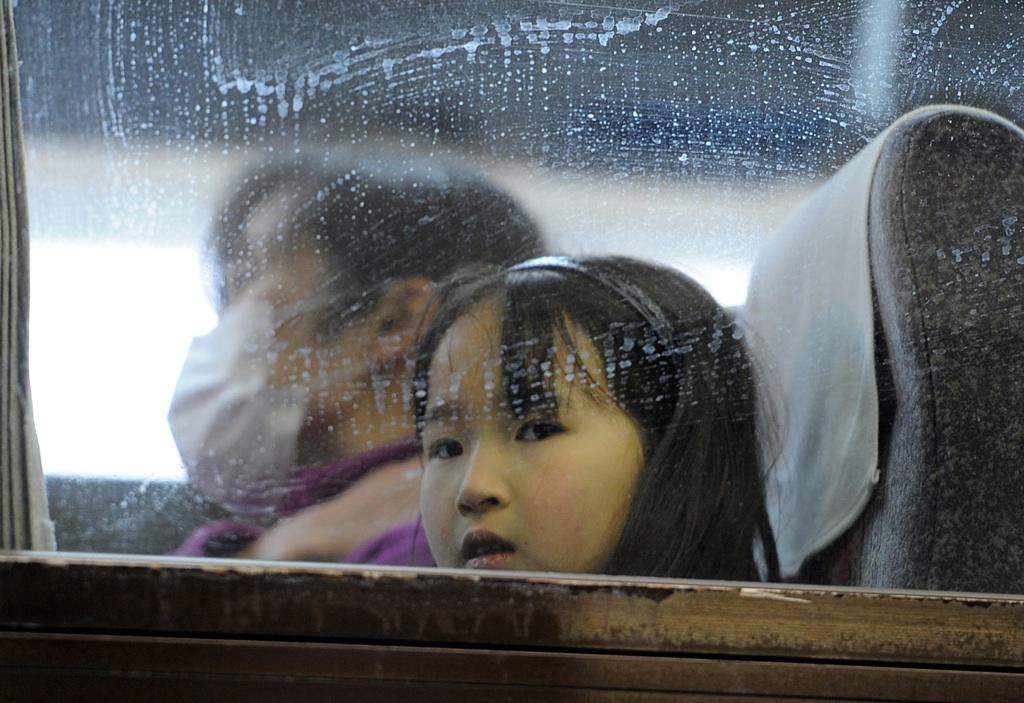Fukushima parents furious over radioactive playgrounds
A young girl looks out from a bus window after explosions and a fire at Japan’s quake-hit nuclear plant in neighboring Fukushima prefecture unleashed dangerous radiation on March 15.
Angry parents in Fukushima have dished out a bag of radioactive dirt to government officials in protest against attempts to water down nuclear safety standards.
Changes to regulations mean that school children could be legally exposed to radiation levels 20 times the existing limit, sparking outrage from parents. A senior adviser has quit in protest and Prime Minister Naoto Kan has been verbally attacked by members of his own party, British daily The Guardian has reported.
Japan’s government has defended a hike in the acceptable safety level from 1 to 20 millisieverts. It was the only way, ministers argued, to ensure children could still go to school in the Fukushima prefecture, which has been exposed to radiation leaking from the nuclear power plant damaged in the March 11 earthquake.
Three quarters of schools in the area may have radiation levels higher than the old safety level of 1 millisievert. Local authorities have attempted to solve the problem by digging up the top layer of soil in school and day care centres, The Guardian reported.
By lifting the limit to 20 millisieverts, the schools can stay open. Twenty millisieverts is the maximum dose allowed for German nuclear workers. Fukushima workers, according to Japanese news agency Kyodo, could previously be exposed to 100 millisieverts over five years and 50 millisieverts in any one year. But the nuclear crisis prompted the government to raise the limit to 250 millisieverts per year.
A group representing 250 parents in Fukushima went to the parliament and handed government officials a bag of radioactive dirt from the playground of one of the affected schools as a demonstration. A geiger counter gave the dirt a reading of 38 millisieverts, The Guardian reported.
“How dare they tell us it is safe for our children?” asked Sachiko Satou, of the Protect Fukushima Children from Radiation Association. “This is disgusting. They can't play outside with such risks. If the government won't remove the radioactive dirt then we'll do it ourselves and dump it outside the headquarters of Tokyo Electric.”
Nor can officials actually state categorically that 20 millisieverts is safe for children. The Nuclear Safety Commission has denied it was bullied into accepting the new standards by government officials, or even that it agreed 20 millisieverts was safe.
“I think 20 millisieverts is safe but I don't think it's good,” Itaru Watanabe of the education ministry said.
He promised the government would carefully monitor the situation and do all it could to get radioactivity down to 1 millisievert.
How dangerous the new level could be for children is open to dispute.
Physicians for Social Responsibility – a US-based Nobel prize-winning organisation that opposes nuclear power – said children were more vulnerable than adults. It said the new acceptable limit exposed children to a one in 200 risk of getting cancer, compared with a one in 500 risk for adults.
“It is unconscionable to increase the allowable dose for children to 20 millisieverts,” the group said in a statement. “There is no way this level of exposure can be considered safe.”
Toshiso Kosako, a Tokyo University professor hired as an advisor to Prime Minister Kan, quit on Friday and accused the government of breaching international standards for political expediency.
Mori Yuko, an upper house member from Kan’s Democratic party, said she was disgusted by the decision.
“Would politicians and bureaucrats allow their own children to go to a contaminated school?” she asked. “This makes me furious.”
Every day, reporters and producers at The World are hard at work bringing you human-centered news from across the globe. But we can’t do it without you. We need your support to ensure we can continue this work for another year.
Make a gift today, and you’ll help us unlock a matching gift of $67,000!
